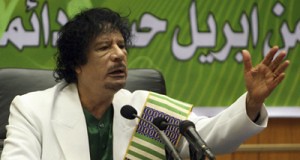
Libyan leader Muammar Gaddafi led his nation in fighting the system of western imperialism. The West bombed the North African state for eight months., a photo by Pan-African News Wire File Photos on Flickr.
Libya arms to Argentina uncovered
The late Colonel Gaddafi had tried to supply arms to Argentina during the Falklands War, newly released records show
A secret plot by Libyan leader Colonel Muammar Gaddafi to supply arms to the Argentinian junta in the midst of the Falklands War was dramatically unmasked by British agents, according to newly published official files.
An alert British air attache discovered the Argentines were using the airport at Recife in Brazil as a staging post for shipping weapons from Libya into neighbouring Argentina, papers released by National Archives under the 30-year rule show.
The attache had a well-placed source at the airport who was able to board one of the Aerolineas Argentinas Boeing 707 flights and saw for himself a series of six long wooden boxes, apparently packed with missiles.
On May 31 1982, George Harding, the British ambassador to Brasilia, cabled the Foreign Office: "Air attache who came within five yards of the aircraft last night reports crew was very nervous, with armed security guards in evidence. Source is only person allowed on board aircraft which reflects both his privileged position and vulnerability if we do not guard info with great care."
The attache himself later described how, under the cover of darkness, he was able to observe the Argentinian air crew on the ground.
"During the turn-round the captain and two members of his crew talked on the ground with the Argentine consul," he informed London.
"Three other crew members were obviously guarding the aircraft and were clearly armed. One of them was positioned at the top of the aircraft steps to prevent anybody entering."
The Foreign Office discounted suggestions that the boxes contained the deadly Exocet missiles which had wreaked havoc on the British Task Force, but were anxious to stop the flow of weapons.
Harding said the Argentines were operating with the "evident connivance" of some in the Brazilian authorities. He cautioned, however, against what he called "direct action", either on the ground in Brazil or while the aircraft were in flight.
"I consider that the Brazilian reaction would be immediate and adverse, calling in question our adherence to international law," he told the head of the Foreign Office emergency unit. "I would rule out any direct action on Brazilian territory, however high the stakes. Operationally it would be very difficult to guarantee success and the political consequences could poison our relations with Brazil for a very long time."
The Foreign Office cabled back: "We have ruled out any idea of quote direct action unquote in Brazilian territory, and have no current plans to take it outside Brazil."
Instead it was decided to embarrass the Brazilians into halting the flights by leaking details through a third country, in order to protect the air attache's source.
No comments:
Post a Comment